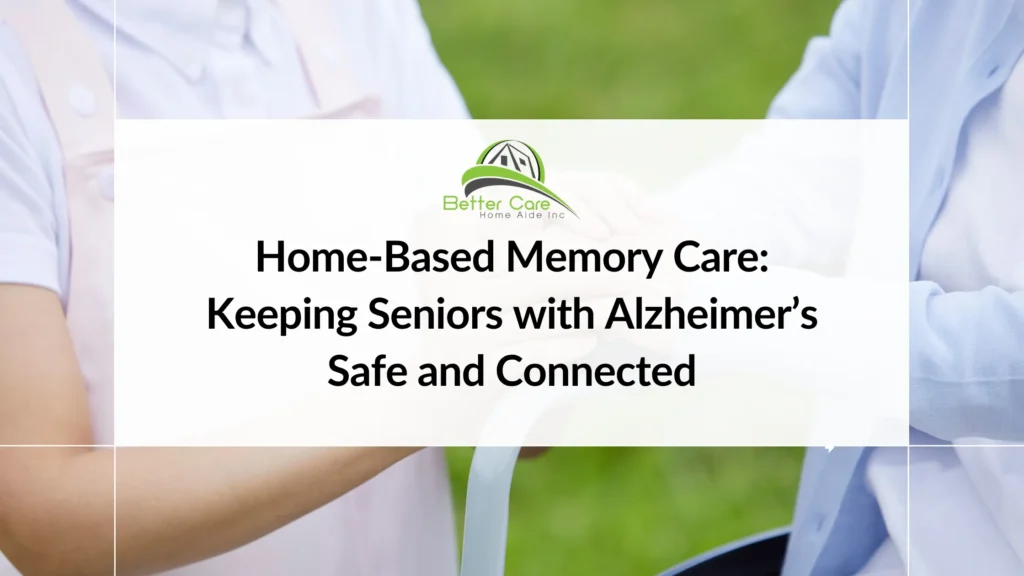It’s a moment that many families experience, a quiet turning point that shifts everything. Maybe you found the house keys in the sugar bowl for the third time. Perhaps your mother, who could navigate the streets of Atlanta with her eyes closed for fifty years, got turned around on her daily walk. It’s in these small, heart-wrenching moments that a difficult question begins to surface: How can we keep them safe?
For so many seniors, the desire to remain in their own home is powerful. It is a place of comfort, familiarity, and a cornerstone of their goal for aging in place. Honoring that wish while navigating the progression of Alzheimer’s or dementia feels like a monumental task. You are not alone in this feeling. The journey of dementia care is a path of adaptation, and it is possible to create an environment at home that is not only secure but also filled with connection and dignity.
Key Pillars of Home-Based Memory Care
- Safety: Focus on modifying the home to prevent falls, accidents, and wandering. This includes de-cluttering, securing cabinets, and improving lighting.
- Connection: Prioritize emotional well-being through predictable routines, sensory engagement, and patient, validating communication.
Practical Home Safety Tips for Alzheimer’s Care
The first step in providing effective memory care at home is to look at the familiar environment through a new lens, prioritizing safety above all else. The goal is not to turn a home into a sterile facility, but to gently remove potential hazards and reduce sources of anxiety. For additional resources, the Alzheimer’s Association offers extensive checklists for home safety.
Here are some practical memory care tips for home safety:
- Simplify the Space: Remove clutter, excess furniture, and throw rugs to create clear, safe pathways.
- Secure Key Areas: Install safety locks on cabinets with chemicals and use automatic shut-off devices on the stove.
- Enhance Lighting: Use bright, even lighting throughout the home to reduce confusion, especially in the evening to help with sundowning.
- Support Daily Routines: Consistent help with daily activities, a key part of effective personal care, helps maintain a sense of normalcy and safety.
- Use Simple Labels: Place clear, easy to read labels on drawers and cabinets to foster independence and reduce frustration.
Tips for Connecting with a Loved One Who Has Dementia
While safety is paramount, a person’s quality of life is defined by more than just physical security. The heart of successful in home memory care lies in nurturing connection and providing emotional comfort.
Establishing a gentle, predictable routine is one of the most effective ways to reduce anxiety. When days have a familiar rhythm, it creates stability. This consistent engagement, a core part of effective companion care, is crucial for emotional well-being. Using activities that provide cognitive stimulation, like listening to music from their youth or looking through photo albums, can evoke positive feelings and strengthen connections.
It’s often more effective to join their reality than to try and correct them. This approach of validation over correction preserves their dignity and reduces distress.
Communication also needs to adapt. Practice patience, use short and simple sentences, and make eye contact to show you are present.
The Role of Specialized Support in Atlanta
As the needs of your loved one evolve, providing care can become more demanding. It’s a sign of strength, not weakness, to seek support and prevent caregiver burnout. For families looking for the best memory care in Atlanta, it’s important to understand the difference between general assistance and specialized memory care services.
Professionals trained in memory care for seniors have a deep understanding of the disease’s progression. They are skilled in the communication techniques and safety protocols that are so vital. Bringing in this type of support can provide family caregivers with much needed respite, allowing you to focus on simply being a son, daughter, or spouse again. This comprehensive approach to well-being is the goal of any high quality memory care program.
For families in Loganville and across Gwinnett County, creating a safe and connected home is possible. It requires patience, creativity, and a willingness to adapt. By implementing these practical strategies, you can honor your loved one’s wish to age in place, ensuring their home remains a true sanctuary. If you have questions about creating a safe and supportive environment, our team is here to help.
Questions from Loganville Families
1. What is the first thing I should do to make my home safer for a parent with dementia? The most immediate and impactful step is to remove all tripping hazards. Go through the home and clear pathways, secure loose cords, and remove small throw rugs. This single action can dramatically reduce the risk of a fall.
2. How can I reduce my loved one’s agitation at home? Agitation often stems from confusion or overstimulation. Creating a calm environment with a predictable routine is the most effective strategy. Playing soft, familiar music and reducing clutter can also significantly help.
3. Is in-home memory care a better option than a facility? The best option depends on the individual’s needs. However, in-home memory care allows a senior to remain in a familiar, comforting environment, which can significantly reduce anxiety and confusion. It offers a personalized, one on one level of attention that is often beneficial for those with memory loss.

